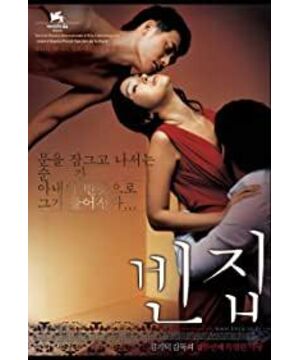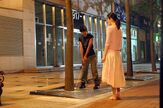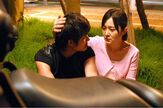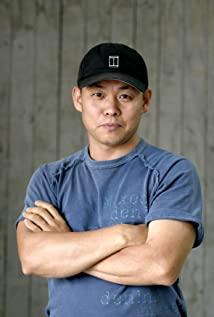The dream begins in front of the statue of the goddess. The goddess trembles behind a camera-covered net - ostensibly caused by the impact of a golf game - conveying a vague sense of unease. At this time, of course, we do not know that it is actually a metaphor for the living state of the heroine Shanhua: abused by a nervous husband, silent and powerless struggle, hiding in the dark. It was not until the second appearance of the goddess in the film that the audience gradually realized what. Luxurious courtyards, holy goddesses, and mourning women. These come into people's field of vision along the behavior of the hero Tai Shi. Tae-seok skillfully opened the door and entered, looked around, roamed the rooms, flipped through the magazine, heard the recording of the call, and the past and present of the woman in the frame of the magazine—Shan Hua’s past and present were contained in it.
In fact, the backgrounds of the owners of the several houses that Taishi entered before and after were also explained through the camera lens in a few words according to his gaze - this is Kim Ki-deok's usual concise and clear film language: not only a glimpse of the owner's general appearance It also showed Tai Shi's unchanging life: he broke into the empty rooms with the lock-picking toolbox, and lived in them like a master - brushing his teeth, bathing, cooking, eating, watching TV, sleeping, repairing objects, washing and drying clothes. It is not so much that Taishi helps the homeowner to repair the broken house and wash the dirty clothes as compensation for the reckless intrusion. It is better to say that these are just ordinary household chores for Taishi as the owner, even if it is only for a few short days. . However, in the process of peacefully enjoying the master's fun, Tai Shi will do one thing that drags himself away from the "master" position: take a group photo - with the family portrait on the wall, with the portrait pottery on the cabinet, with the hanging Photographs, a digital camera prominently captured him as an outsider (and later served as strong evidence of his imprisonment). Maybe it was because of his childlike simplicity that he directly recorded his life in this way, but it is more likely that it came from the loneliness in his heart: in an empty room with only one person, he could only live with this unreal but Group photo of "people" that are real enough for him. Although they can't speak, their eyes are gentle and their smiles are full of smiles. They are far more ideal than Shanhua's husband. At the beginning of the film, Taishi's first dealings with social people leave Taishi with only harsh voices. flute, vicious eyes. It is not difficult to speculate that Tai Shi is eager to communicate, but in a modern city, he was forced into empty rooms by such indifference. Therefore, before Shanhua appeared, he only smiled when taking pictures with unreal "people".
Then, dreamily, Tai Shi meets Shan Hua. In other words, Shanhua met Taishi. Because Shanhua in the dark spot first discovered the strange intruder Taishi. In Shanhua's point of view, Tai Shi unknowingly cooks, eats, washes, bathes and repairs scales. For Tai Shi, Shan Hua at this time was like a ghost, and he could not see her - it was as if Tai Shi, after being released from prison, sneaked back to the luxurious courtyard with the "invisibility skills" he practiced in prison. Can't see him. But the difference is that although Shanhua can't see him, he can feel it with joy, while Tai Shi can't see or feel it at first. Because love has not yet sprouted.
There are more than one such inversions in the film. Tai Shi can hug Shan Hua who is crying, Shan Hua can also hug Tai Shi who is crying. What Kim Ki-duk is telling is by no means an innocent fairy tale about a hero riding a white horse (Tae Seok riding a motorcycle) to save a beautiful woman (Seon Hwa) from fire and water (a depressing family environment). Not only is Tai Shi not an invincible iron-clad warrior, but at some point he shows a vulnerable side. If it is said that Tae-seok had established an image of an almighty savior in front of Shan-hwa before he was punched by the boxer, then after that, this image collapsed with a bang - and their love ignited (in the tea house) . Because love is equal and mutual, only when Tai Shi is downgraded from "God" to "Human" can Shanhua be upgraded from "gratitude" to "feeling".
In fact, this gesture of warming each other has never existed only in love. For example, there is something similar to love between Leon and the little girl Matilda in "This Killer Is Not Too Cold", the family relationship between the village grandmother and Chengyou in "Love Home", the relationship between the old judge and Valentine in "Red" Friendship like love. They all met in the film because of some chance, and after some running-in, they changed each other and finally merged into their hearts. There was a gentle light in Leon's eyes looking at the little girl, Cheng You slowly put on a small needle and thread for her grandmother, and the old judge slowly started the car that he hadn't driven for many years to find Valentine. The change is going on unconsciously, and snuggling is getting used to it bit by bit. However, careful comparison and analysis can show that the two parties are not in a completely equal position, and one party is always more or less dominant, that is, one party is the rescuer and the other party is suspected of being the rescued. The little girl's rebelliousness simply stripped Leon's indifferent appearance and showed her natural tenderness. Grandma's forbearance and caressed Chengyou's arrogant children in the city. The haze casts a warm light. And only Taishi and Shanhua can be considered as the real mutual cocoon breaking: Shanhua's cocoon cracked a little when she saw Taishi's beautifully shaped skirt after she came out of the bath, and Taishi used the car at the door. Shanhua took a big step when she got into the car, and continued to mature in ritual expressions such as cutting up and re-splicing her own photos, and asking Tai Shi to help her cut her hair. She, she almost broke the cocoon into a butterfly when she took Tai Shi's hand; although the cocoon on Tai Shi's body is invisible, we can't exactly identify the steps of breaking the cocoon, but Kim Ki-duk gave a hint: First, start from repairing toys, Repairing the scale in Shanhua's house, repairing the wall clock in the photographer's house, and repairing the VCR in the boxer's house, Tae-seok continued to mend his life until he entered the tea art house, the place where love ignited. He tinkers - he doesn't need to: after Tae-shik was beaten and Shan-hwa fed him instant noodles, after Tae-shik's anger was playing golf on the roadside and hurt innocent people, he hugged and cried, and Shan-hwa hugged him Behind his shoulders, he no longer needs to mend his life after he emerged from the cocoon. Secondly, Tai Shi alone takes a photo with an unreal person in an empty room. In the original sense, it is still a way to record life. After Shanhua took the initiative to get into the shooting range of the digital camera, it was not only a record of life, but also a way of recording life. It also has a taste of freehand life, and some more vivid colors - because the two smiling faces in front of the camera have already covered the smiling photos on the wall, Tai Shi even used props (boxing headgear, etc.) to entertain. This is undoubtedly due to the power of Shanhua. Finally, in the tea art house, Tai Shi no longer
For the male and female protagonists, this tea house is the most tender place, there is no trivial housework, no suppressed singing and mood, only the beauty of the beginning of breaking the cocoon and becoming a butterfly together. So Shanhua chose this place as a place for memories after Tae-seok was imprisoned. Without words or tears, she lay peacefully on the bench in front of the coffee table and closed her eyes to enjoy the short-lived beauty alone. This is Shanhua's way of recalling Tai Shi's memories (such as repairing scales, laundry) calmly and tenderly. Similarly, Tai Shi can't wait to enter the memory after being released from prison. However, he used his own method: ghostly sneaked back to the empty rooms that were once vacant, and looked at the ones he had touched together, and deliberately left traces for the owner to ponder in a prank-like manner-covered the huge photos of Boxer's house with white paper The boxer's eyes, moved the cushion on the Tea Art Curie bench to the side, and took the photo of Shanhua in the frame of the photographer's home. The mildest of these so-called pranks is undoubtedly a small gesture at the Tea House.
From another point of view, these empty rooms are no longer "empty", and the homeowners (both pairs of lovers) appear one after another: they are both the testers of Tai Shi's "invisibility skills", and after Tai Shi's release from prison Bystanders who recall the past, their own activities constitute a complex life. Lovers are either passionately in love, or quarreling, or live plainly and sweetly, and every empty room has a story. Along with three other empty rooms in the film: the home Tae-seok first broke into in the film, Shan-hwa's luxurious courtyard, and the old man's home that led Tae-seok to jail on suspicion of murder, it presents a broad life Meaning. Kim Ki-duk is not limited to a single line of development of the hero and heroine's stories, and uses "empty rooms" wisely and appropriately to reflect various lives. And the story of Shanhua and Taishi is just one of the empty rooms - the story of Shanhua's luxurious courtyard.
From this point of view, this story is becoming more and more realistic. It seems to be about the realistic theme of modern people breaking out of the cocoon of modern society, and it is more and more deviated from the so-called "dream". In fact, in the second half of the film (when Taishi practiced his invisibility skills in prison and after), the use of a lot of unstable, close-to-subject panning lenses makes the audience get a strange feeling like a ghost point of view. And we know that these viewpoint shots are all from Taishi's eyes, which implicitly means that Taishi himself is as unreal as a ghost. It's just that the audience, like me, was quickly carried away by the ecstasy of the reunion between Sun Hwa and Tae Seok that followed, and was slapped by Kim Ki-duk just when he was about to exit the stage with satisfaction: It's hard to say, the world we live in Is it reality or fantasy. On top of these words, all the good things built up were shattered. When we woke up from the dream, we discussed in a hurry with a heavy heart, whether Tai Shi was Shan Hua's dream or Shan Hua was Tai Shi's dream; and ignored, Jin Ji De, who woke up from the dream, was smiling in Venice with a silver lion in his arms. .
View more about 3-Iron reviews









